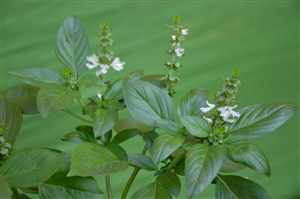Tulsi (Ocimum tenuiflorum), Holy basil
Main Facts about Tulsi

Using Tulsi
Chinese medicine uses holy basil for stomach spasms, kidney conditions, to promote blood circulation, and to treat snake and insect bites. In India it is used to treat colds and flu, reduce fever, and relieve various skin conditions. Tulsi makes a great healing tea that helps respiratory system. The tea also helps reduce the effects of stress, both physical and psychological. Enhances physical and mental endurance, increasing assimilation of oxygen and nutrients to the bloodstream. Holy basil functions as an adaptogen, enhancing the body's natural response to physical and emotional stress. It does not alter mood, but rather, it helps the body function optimally during times of stress. Multiple scientific studies have found that supplementation with various extracts of holy basil decrease stress hormone levels, corticosterone in particular. Lower levels of corticosterone are associated with improved mental clarity and memory, and long-term, can reduce the risk of age-related mental disorders. Holy basil removes phlegm/mucus from bronchial tube, bronchitis and asthma. Seeds help mucus membranes. Just chewing on Tulsi leaves relieves colds and flu. Also mix Tulsi leaves with cloves and sea salt for immediate help with flu. Research on holy basil suggests that it contains powerful antioxidants and may provide protection to the liver. Also, early studies are looking into holy basil's effects on ulcers, blood sugar levels in diabetics, cavity prevention, and changes in immune response.Tulsi is a remedy for: Cold and flu, Anxiety
Caution!
Not recommended for use if pregnant, nursing, or are considering becoming pregnant (may have an anti-fertility effect). Do not administer to infants or toddlers. May lower blood sugar. Has mild blood thinning properties.Cooking with Tulsi
Holy basil is most often prepared as an herbal tea, also smoked alone or as part of a blend. The leaves and the seeds may both be used. Dried and powdered leaf and fresh leaves are also often consumed, or are mixed with ghee and taken in that way.How to grow Tulsi
Sow in spring, just below surface, tamp well and keep evenly moist, warm and in the light. Germination time - 16 day in warm soils. Best germination environment is in a good greenhouse or under lights, but it may be possible to direct seed in the garden if the soil is very warm. Does well in pots. If you live in frost-free zones, this will make a perennial bush to 4 feet. If you live in the temperate north, grow as an annual or bring indoors for the winter. Plant prefers full sun, fertile soil, and regular watering.| Thyme (wild) |
Turmeric
|